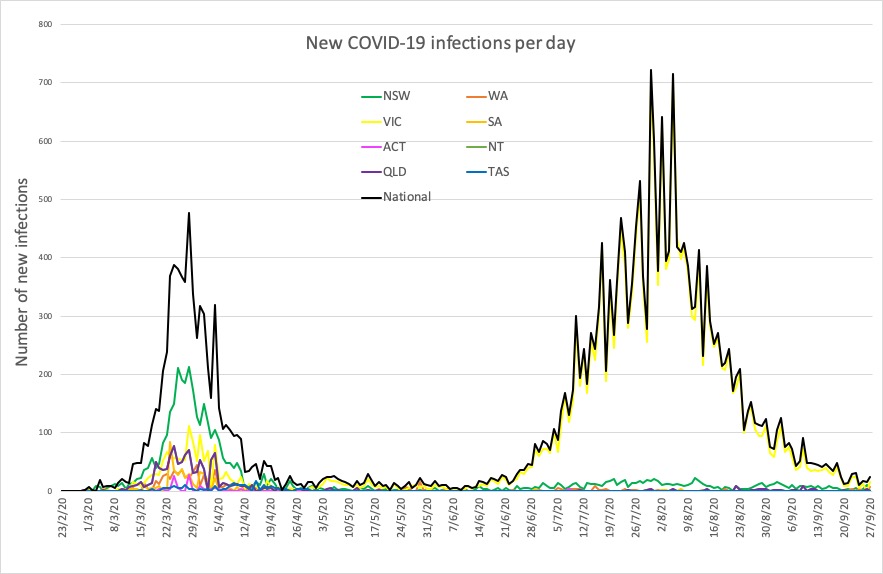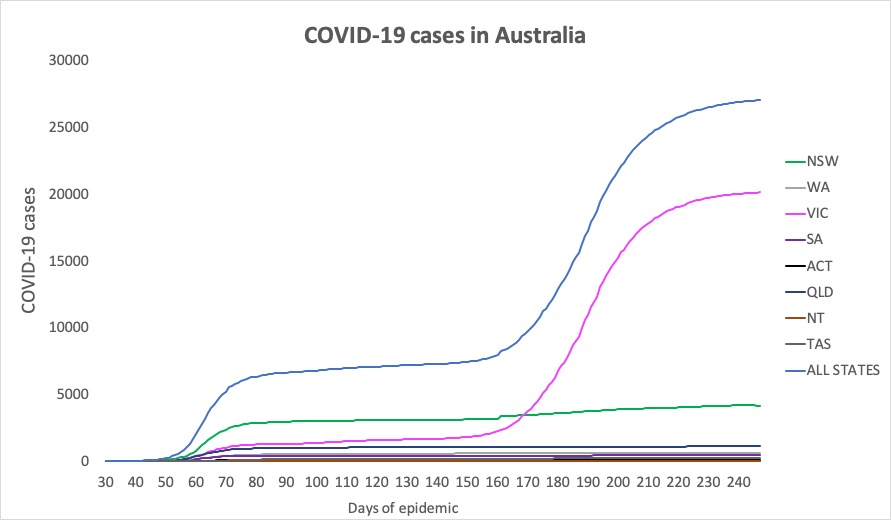Transaminitis, severe ileus and bowel ischaemia may be far more common in those with COVID-19-related acute respiratory distress syndrome than in those with non-COVID-19 ARDS.
Welcome to The Medical Republic‘s COVID Catch-Up.
It’s the day’s COVID-19 news in one convenient post. Email bianca@biancanogrady.com with any tips, comments or feedback.
28 September
- Gastrointestinal complications common in severe COVID-19, study finds.
- Continued dispensing arrangements to continue until March 2021, PBS says.
- Significant increase in uptake of tele-abortion during pandemic, Marie Stopes Australia says.
- Plosives propel potentially pathogenic particles, study suggests.
- Latest confirmed COVID-19 infection numbers for Australia.
- Gastrointestinal complications such as transaminitis, severe ileus and bowel ischaemia may be significantly more common among individuals with COVID-19-related acute respiratory distress syndrome (ARDS) compared to those with non-COVID-19-related ARDS, research suggests.
A study published in JAMA reported the outcomes for 486 patients with ARDS, 242 of whom had severe COVID-19 and 244 of whom did not. This found that patients with COVID-19 were more than twice as likely to develop gastrointestinal complications than those without COVID-19. Just over half the patients with COVID-19 developed transaminitis compared to just over a quarter of the non-COVID-19 patients, 48% developed severe ileus compared to 22% of the non-COVID-19 cohort, and 4% of the COVID-19 patients developed bowel ischaemia while none of the non-COVID-19 patients did.
Pathology studies of three of the patients with COVID-19 and bowel ischaemia showed thrombi in the bowel microvasculature with areas of necrosis.
The authors suggested that high expression of ACE2 receptors – the receptor that SARS-CoV-2 uses to gain entry to cells – in the gut could account for the impact on the gastrointestinal system, while coagulopathy could also be responsible for the high rate of ileus and ischaemic bowel disease. - Continued dispensing arrangements will now continue until March 2021 to “support continuity of therapy for consumers who are unable to access their medical practitioner to obtain a valid prescription,” the PBS has announced.
The arrangements – which allow patients to obtain one continuation in 12 months of an existing prescribed PBS medicine without a prescription if they can’t obtain one – were introduced during the 2019/2020 bushfires, extended throughout the COVID-19 pandemic, and have now been further extended. - The pandemic has seen significant uptake of ‘tele-abortion’ in Australia, according to Marie Stopes Australia.
Tele-abortions enable women to have a telehealth consultation with a doctor, receive the abortion medications by courier, and then have free access to a 24-hour nurse aftercare service.
Marie Stopes Australia has had a 163% increase in uptake of the service in metropolitan areas, 42% increase in regional areas and 189% increase in uptake by women in remote areas, compared to the same period last year. The organisation said the increase doesn’t necessarily mean an overall increase in abortion rates, but rather an increase in how people are choosing to access these services.
“This data underscores the importance of the Australian Government clarifying if the recent announcement to extend temporary Medicare telehealth support also applies to medical abortion and other vital sexual and reproductive health services,” the organisation said in a statement. - Peter Piper picked a pandemic. It turns out that plosive sounds – such as the letter ‘p’ – propel exhaled and potentially SARS-CoV-2-carrying air in a ‘conical, turbulent and jet-like flow’ of air over two metres within 30 seconds, according to a paper in PNAS.
“Flows exiting from an orifice are well known to produce vortices, even in the absence of coughing, and these drive the transport about the head,” the authors wrote of their study, which used high-speed cameras to visual the fluid mechanics of air movement during speech – in particular, during pronunciation of the phrase “Peter Piper picked a peck”.
While stressing that they are not health experts, the authors said their results show there isn’t some kind of ‘wall’ beyond which virus particles don’t spread during conversation. - New South Wales has had its first 24 hours without any new cases of COVID-19 since June. Three cheers. Western Australia’s seven new cases are all crew from the bulk carrier Patricia Oldendorff, which is anchored off Port Hedland.
Meanwhile, the latest confirmed COVID-19 infection numbers from around Australia to 9pm Sunday are:
National – 27,040, with 872 deaths
ACT – 113 (0)
NSW – 4218 (0)
NT – 33 (0)
QLD – 1157 (1)
SA – 468 (0)
TAS – 230 (0)
VIC – 20,145 (16)
WA – 676 (7)




